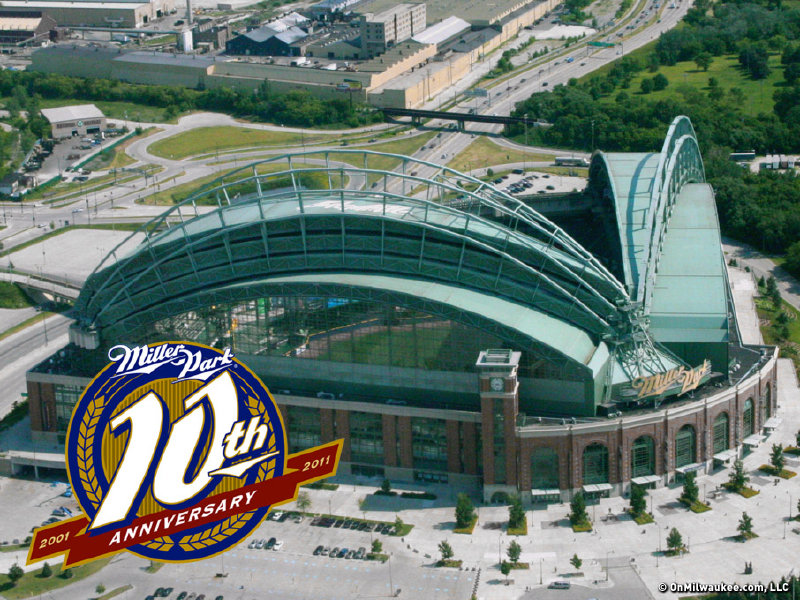"Build it now," they cried.
Now that's it's built, there is no mistaking that Miller Park has had a profound effect on the Milwaukee Brewers' fortunes.
Since opening in 2001, more than 25 million fans have passed through the turnstiles with records set for attendance three times during that span.
Twice since the ballpark -- originally estimated to cost $290 million -- opened, the Brewers drew more than three million fans. It's a gaudy number when you take into account that Milwaukee, with a population of 602,782 (and about 1.6 million in the metro area), is the smallest market in Major League Baseball.
Still, the limited market size hasn't deterred the Brewers, who have moved into the middle of the league in terms of payroll, averaging 2,937,896 million fans over the last three seasons.
The ability to pay high salaries for young talent like Ryan Braun, Yovani Gallardo, Corey Hart and Rickie Weeks while adding, in recent seasons, players like CC Sabathia and Zack Greinke, is directly tied to the team's attendance and, in turn, connected right back to Miller Park.
"It doesn't matter if you're the Yankees, the Brewers, the Marlins or the Giants, ticket sales are still your No. 1 source of revenue," says Brewers vice president of business operations, Rick Schlesinger. "There's no question that Miller Park has been integral to the success we've had."
The goal now is to make three million the benchmark as opposed to a goal. It's a lofty goal for the market but thanks to Miller Park, especially its signature roof, it's easily attainable with the right combination of marketing and on-field success.
"Three million is where we want to be," Schlesinger says. "I want to keep setting attendance records so really, it's three million-plus."
The key, Schlesinger says, is a combination of group sales and a quick start. Because of the roof, fans planing to come to Milwaukee are almost guaranteed to see a game (there was one suspended game in June 2001 due to a power outage).
As a result, nearly half of all tickets sold for Miller Park games have gone to people living outside the five-county area where the Miller Park sales tax is applied. In 2010, when the Brewers drew 2,776,531 fans to the stadium, 1,405,237 tickets were sold to buyers from within the stadium district.
Doing that just wouldn't have been possible in County Stadium. The facility was falling apart long before it closed its doors following the 2000 season, a year later than scheduled due to the tragic crane collapse during Miller Park construction. Pipes were breaking. Regular maintenance had been put aside because both the Brewers and Milwaukee County, which owned the stadium, were out of money.
A new stadium was the only solution.
"The Brewers couldn't survive in County Stadium," says former state Sen. George Petak, who famously changed his vote in the early morning hours of Oct. 6, 1995. He had twice earlier voted against the proposal, which applied a 0.1 percent sales tax in Milwaukee, Waukesha, Washington, Racine and Ozaukee Counties. "They were losing money. Other communities were asking them to move there."
Unlike other markets, where ownership threatened to move a team to greener pastures, there were never any outright threats from owner Bud Selig to relocate. Still, the reality was there: without a new stadium, Major League Baseball in Wisconsin could not survive.
"It came down to a question, after hours and weeks of debate, should it pass or should it go down to defeat and see the Brewers leave town," Petak says.
"As the debate continued and I was not able to remove Racine County from the funding package, I ultimately decided to change my vote."
Nine months later, Petak was recalled from office in large part because of his vote to build Miller Park. Today, he and his wife live in Nashville, where they are closer to their children. Petak is out of the political game now, but still considers changing his vote the "right thing to do."
Miller Park's history hasn't always been so rosy. There was a contentious and bitter battle to fund the stadium's construction. There were veiled hints at franchise relocation. Petak lost his job while three iron workers lost their lives. And then there's the Miller Park sales tax, which still angers many today.
Still, the proof lies in the numbers: the Brewers said the stadium would turn the franchise into competitors. Payroll and attendance are up. There have been playoff games in Milwaukee. Baseball is here to stay because of Miller Park.







